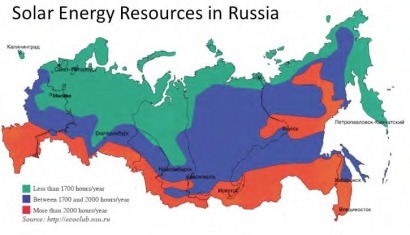
“I am quite confident this will happen,” says Tomasz Slusarz, who in 2008 founded Solar PV Consulting, a business-to-business service provider with a focus on Central Eastern Europe, Russia and the CIS.
Slusarz says he based he bases his optimistic forecast on his observation of the “policy and market situation” over the past eight years, and comparing it to the current situation in Russia.
The conference, Solar Russia 2011, is part of the larger RUSNANOTECH forum. Slusarz, who is the organizer of the event, offers several conclusions to back his premise.
To begin with, he says, he has noticed “a growing understanding from Russian policy makers and the private sector that increased use of renewable energy technologies can help meet the growing demand.”
Recently, he says, the Energy Strategy of Russia set a target of 4.5 percent for the installed renewable electricity generation by 2020 (including small hydro up to 25 MW), “which means a requirement of 22 GW for the new installed capacity”.
“As there are no [set asides] within the 4.5 percent target, theoretically, quasi whole renewable energy capacity can be built from small hydro, wind, biomass or geothermic sources,” Slusarz says. “However, in my opinion, solar PV with its increasingly competitive prices can become a quite an important piece of the 22 GW cake.”
Slusarz also points to the fact that the Russian solar industry and RUSNANO, a state-owned fund, have invested billions of dollars in new manufacturing facilities such as Hevel Solar (thin-film PV), and Nitol (large-scalepolysilicon and monosilane manufacturing).
“When looking at the increasingly competitive global solar markets, they realize the urgent need to establish a sustainable domestic market in order to help the Russian industry grow and be able to compete on export markets,” he says.
Slusarz says he was further encouraged a few weeks ago when he learned of a plan in Russia’s North Caucasus region to establish its own “Silicon Valley”.
The plan, a joint venture between the government and private businesses, is projected to cost $1 billion (€747.2 million) and a production volume of $12 billion (€8.9 billion) annually.
Polycrystalline silicon production would be located in the Stavropol region, with monocrystalline silicon production set up in Kabardino-Balkaria. The final production of photovoltaic cells and solar modules would be located in Karachay-Cherkessia and Dagestan respectively.
“I am quite sure that if the project is successful, a lot of modules will be installed not only in the region but also all over the country,” Slusarz says.
Finally, he argues that while Russia has long been one of the world’s largest gas and oil supplier, the sun is actually its most abundant resource.
“The technical potential of solar energy was estimated as 1.870 TWh, with an economic potential of around 101 TWh per year in the national report titled ‘Role of renewable energy sources in energy strategy of Russia,’” Slusarz says.
“The southern parts of Russia, especially the North Caucasus, have the greatest potential forsolar energy,” he continues. “The Krasnodar Region and most parts of Siberia have insolation levels comparable to the south of France and central Italy while the Zabaikalsky Region gets more solar energy than Spain.”
Solar Russia 2011 is intended to bring together Russian and international industry experts to discuss and develop strategies to kick-start the Russian solar market.
This event, which is being held at the Moscow Expocentre, will also facilitate exchange among Russian industry and investors, and international solar business as well as the world of technology. Throughout the event coverage will be provided on SolarPV.TV (http://SolarPV.TV) and sessions will be available on demand following the event.
For additional information:

